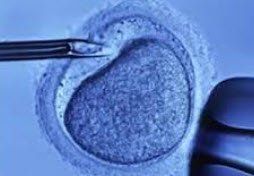Infertility and Assisted Reproduction
What Is Assisted Reproduction? There are a number of medical interventions that may help you to get pregnant.
Free PCOS Newsletter
IUI - Intrauterine Insemination.
IUI is a medical procedure that places your partner's sperm directly into your uterus. The advantage of IUI is that it puts a much larger number of sperm into your uterus than would occur normally with intercourse. IUI may be useful if your partner has a low sperm count. Assuming that you are ovulating, a pregnancy success rate of about 15% has been reported.
IVF - In-Vitro Fertilization.

IVF refers to removal of eggs from your body, and then fertilizing them with your partner's sperm. A fertilized egg is then implanted into your womb. Although simple in concept, the execution of this procedure is complex and expensive. Here are the five basic steps involved in IVF for infertility.
Step 1. A GnRH analog is given to suppress follicular development. Then, gonadotrophin injections are started, in order to stimulate several follicles to develop. When the follicles reach a proper size, as determined by ultrasound, an injection of hCG is given to stimulate the follicles to prime the eggs for release.
Step 2. The eggs are collected through your vagina with an aspiration needle. You may be sedated for this procedure or receive general anesthesia.
Step 3. Your eggs are placed into a culture dish and fertilized with your partner's sperm.
Step 4. After 2-3 days, the healthiest fertilized eggs (embryos) are transferred to your uterus by a soft catheter through your cervix.
Step 5. Hopefully, one of the embryos will become successfully implanted in the wall of your uterus. To aid implantation, you may be given hCG or progesterone.
In spite of its popularity for infertility, the pregnancy rate from IVF is quite variable, and may not exceed 20%. An IVF procedure can cost $10,000 and up.
Outcomes Worse for Single IVF Births
Many women with PCOS are resorting to IVF (in vitro fertilization) or other assisted reproduction in order to become pregnant.
A study published in the British Medical Journal in January found that single pregnancies resulting from assisted conception such as in vitro fertilization (IVF) have worse outcomes than those achieved without assistance, according to Dutch researchers who reviewed 25 studies on birth outcomes after assisted conception.
They reported that in studies with matched controls, babies born after assisted conception were three times more likely to be born very preterm (before 32 weeks), and twice as likely to be preterm (less than 37 weeks).
Similarly, such babies were three times more likely to weigh less than 1500 grams at birth, and had almost twice the odds of weighing less than 2500 grams.
Children born after assisted conception were also more likely to be delivered via caesarean and to require intensive care after birth. Those children were also 68% more likely to die around the time of birth.
Lead researcher Dr. Frans Helmerhorst said that the emphasis of assisted reproduction should shift further away from simply achieving a pregnancy to achieving a successful outcome. "In this case, the product is a healthy baby, not just a baby or a pregnancy."
There are a variety of natural methods for you to increase your fertility and become pregnant. Most licensed naturopathic physicians are skilled in these methods. You can find one near you at:
www.naturopathic.org
Source: British Medical Journal Online First publication, 2004 (www.bmj.com)
GIFT - Gamete Intra Fallopian Transfer.
GIFT involves collection of eggs, mixing them with sperm, and placing a maximum of 3 eggs into your fallopian tubes. The eggs are obtained by a laparoscope inserted through the abdomen, so general anesthesia may be required. It is expensive and the "success rate" in PCOS women may be low.
ICSI - Intracytoplasmic Sperm Injection.
This procedure involves injecting a single sperm into a single egg. The technique is not very successful in cases where the egg quality is poor, as is often the case in women with PCOS. Another minor factor to consider is that there is no competition among sperm, where, under normal circumstances, the healthiest sperm is the one that joins the egg.
In summary, the overall pregnancy success rate for IVF and embryo transfers is reported to be in the 25%-50% range, with a lot of individual variability.
Related Articles
- What Is Infertility?
- 17 Tips for Becoming Pregnant
- Dr. Amy Day Reveals How to Promote a Successful Pregnancy
- Natural Treatment Options
- What Are the Common Fertility Drugs?
- Environmental Chemicals Are a Hidden Danger
- New Vitamin to Help Overcome Fertility Problems?
- How to Reduce Pregnancy Risk of Gestational Diabetes
- Inositol + NAC = Ovulation
Get Answers to your Questions about
- Fertility
- Weight Control
- Hair Loss
- Stress
- Unwanted Hair
- Acne...and more!
FREE PCOS Report
and Newsletter

Your email is safe with us. We respect your privacy, and you may unsubscribe at any time.
Recent Articles
-
PCOS Long Journey to The Happy End
Apr 30, 18 07:24 PM
Hi Girls, Maybe my story will have one day a good end but I am not there yet. Until I was 31 years old I lived my dream, having lovely husband, good -
PCOS and Miscarriage
Apr 17, 18 04:03 PM
Proper diet and natural supplements can help the body maintain a pregnancy through successful delivery.
-
How to Deal with PCOS and Stress
Apr 04, 18 04:19 PM
Your body has a natural capacity to heal itself if you provide it with the necessary tools.





